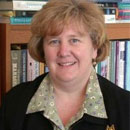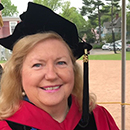Professional MBA
The Professional MBA program at Lasell College explores aspects of leadership in a changing world, including on the study of marketing, economics and entrepreneurship. The MBA program consists of 36 credits that can be completed in 16 months. Lasell offers rolling admission for starts in September and January.
Professional MBA Curriculum
The program is delivered 100 percent online and is taught in four, 15-week modules.
PMBA 701 Organizational Competencies (9 credits)
Organizational Development and Theory
Leading for Organization Success
Organizational Responsibility and Social Justice
PMBA 702 Quantitative Skills (9 credits)
Quantitative Analysis and Decision-Making
Managerial Economics
Statistics for Managerial Decision-Making
PMBA 703 Financial Skills (9 credits)
Accounting for Managers
Financial Analysis for Managers
Global Finance
PMBA 704 Strategic Skills (9 credits)
Supply Chain Management Strategies
Strategic Management
Entrepreneurial Strategy and Value Creation
| Course Code | Course Title | Credits |
|---|---|---|
| PMBA705 | Organizational Theory and Leadership | 3 |
| PMBA706 | Leadership’s Role in the 21st Century Organization | 3 |
| PMBA707 | The Organization’s Role in Ethics and Social Justice | 3 |
| PMBA708 | Quantitative Analysis for Managerial Decision-Making | 3 |
| PMBA709 | Statistical Techniques and Analysis for Managerial Decision-Making | 3 |
| PMBA710 | Managerial Economics | 3 |
| PMBA711 | Accounting for Managers | 3 |
| PMBA712 | Financial Analysis for Managers | 3 |
| PMBA713 | Strategic IT Alignment | 3 |
| PMBA714 | Entrepreneurial Strategy: New Venture Creation, Management and Harvesting Strategies | 3 |
| PMBA715 | Global Marketing Strategies and Dynamic Supply Chain Management | 3 |
| PMBA716 | Global Strategy for Continual Success | 3 |
ECON101 - Principles of Econ-Micro
This course is an introduction to the principles of the economic behavior of individuals, firms, and industries in the mixed economic system. Topics include consumer demand; elasticity; supply and costs of production; the allocation of economic resources; international trade; and the role of government in promoting economic welfare.
ECON103 - Economics of Social Issues
This course examines a broad range of social issues from an economics perspective. Designed for non-business majors, the course provides an introduction to economic reasoning and to some basic economic concepts which are then used to analyze a variety of social problems. Possible topics include poverty, unemployment, agriculture, discrimination, crime, pollution, education, health care, social security, and third world development.
ED109 - Invitation to Teaching
This course explores careers in teaching beginning with the unifying question: Why should I become a teacher? Students examine their motivations to become teachers while they learn about college and state requirements and expectations.
ED110 - Teaching & Learning in American Schools
This course provides students pursuing or considering initial teacher licensure with an overview of the teaching profession. Students study and discuss history and philosophies of education systems, as well as current trends and issues. Massachusetts professional standards and requirements for licensure are explored. This course is a prerequisite for all other ED courses. Twenty-five hours of observation and tutoring in varied school settings are required. This is a presentation-intensive course.
ED210 - Reading & Writing Across the Curriculum
This course emphasizes the processes of reading and the critical nature of reading to learn in the content areas. Focus will be on literacy strategies to support teaching in content areas, the influences of diversity, the current methods of instruction, and assessments used to inform instruction. In addition, the current research on reading to learn will be read, discussed, and integrated in all course activities. Requires a pre-practicum of 25 hours minimum. Prerequisite: ED 219.
ED219 - Supporting Learner Variability
This course introduces students to characteristics of learners with special needs in classroom and community settings. It focuses on principles of Universal Design for Learning in developing appropriate learning environments to meet the variability of all students in Pre-K through high school settings. A required minimum 25-hour pre-practicum provides opportunities to teach and observe in area classrooms. Prerequisite: ED 110
ED308 - Responsive Teaching in Secondary Schools
Students will develop strategies and tools necessary to be responsive secondary. Participants in this course will observe secondary teachers, develop lesson plans, reflect on their teaching philosophy, apply leadership theory to classroom practice, explore current trends and issues that impact secondary classrooms, increase their cultural competence, and expand their toolkit of strategies for differentiating instruction to address the variability of secondary students. A minimum of 25 hours of classroom observation, reflection and teaching is required. Pre-requisite: ED 219
ED309 - Sheltered English Immersion
This course provides a grounding in current theory and practice related to teaching English Language Learners. In particular, students learn to effectively shelter their content instruction, so that ELL students can access curriculum, achieve academic success, and contribute their multilingual and multicultural resources as participants and future leaders in the 21st century global economy. This course meets Massachusetts DESE standards for the required SEI endorsement. Course includes a minimum 25-hour pre-practicum in license-appropriate classrooms. Prerequisite: ED 206 or Department permission
ED435 - Pre-practicum: Secondary History
Through a minimum of 150 hours of observation and reflection in public schools, and regular meetings with school and Lasell faculty, students in this course become familiar with the curriculum and organization of middle and/or high schools and history classrooms in preparation for the practicum. Prerequisite: Senior standing; passing scores on all required MTEL; permission of Department Chair. Co-requisite: ED421
ED484 - Practicum: Secondary History
In this course, students complete a minimum of 300 field hours observing and teaching in a secondary history classroom and meet regularly with both Lasell and school supervisors. Assignments incorporate all Massachusetts requirements for licensure and include topics such as the ethics of teaching, legal and moral responsibilities, student confidentiality, and working parents and community members. Permission of the Department Chair required. Prerequisite: ED 435; passing scores on all required sections of the MTEL
ENG212 - Literature for Young Adults
This course surveys current literature for adolescent and teen readers. It prepares students to evaluate young adult books in terms of literary quality, reader interest, and social and political perspectives. Strategies for use in the classroom are explored; various genres are examined. Prerequisite: ENG 102.
ENV220 - World Geography (KP)
This course surveys the earth's social, cultural and economic patterns and their relationship to the physical geography of the earth. A regional approach is taken to provide a foundation for more intensive systematic studies of important environmental/political issues.
HIST103 - World Civilization I
Beginning with prehistory, this course explores early civilizations and then follows developments in a global context, showing interconnections between Asia, Africa, and Europe. Emphasis is placed on cultural, social, economic, religious, and political developments.
HIST104 - World Civilization II (KP)
This Knowledge Perspective course will provide students with the opportunity to interpret and analyze the complex interrelationships and inequities in human societies in a global historical context. Emphasizing the interrelatedness and mutuality of influence between East and West, we examine questions of exclusiveness, intolerance, and cooperation. Prerequisite: ENG101.
HIST123 - American Civilization I
This course examines the chief political, social, and cultural features of American society as they have developed through the period of Reconstruction. Emphasis is on Colonial America, the War of Independence, the Constitution, and the emergence of the Republic through the Civil War.
HIST124 - American Civilization II
This course is a continuation of HIST 123 from the period of Reconstruction to the present. Emphasis is on reconstruction, industrialization, immigration, constitutional issues, and the emergence of American foreign policy. There is some examination of American political life in the nuclear age.
HIST207 - African American History
This course explores the history of African Americans in the United States from their African beginnings to the present. It traces the lives and status of African Americans, enslaved and emancipated, as they confronted the barriers of legal, institutional, and cultural prejudices; it examines the socioeconomic and political experiences of blacks in America and investigates strategies of accommodation, resistance, and protest in the struggle of African Americans to gain human and first-class citizenship rights. This is a writing-intensive course. Prerequisite: a 100-level history course or ENG 102.
HIST209 - China from 1600 to Present
This course is a survey of modern Chinese history from the founding of the Qing Dynasty in the seventeenth century to Deng Xiaoping's economic reforms of the 1990s. Special attention will be paid to modernization, Western and Japanese imperialism in China, and the rise of Communism under Mao Zedong. In addition to learning about important milestones in Chinese history, students will be introduced to aspects of Chinese art, culture, and women's issues through primary sources translated into English. This is a writing-intensive course. Prerequisite: a 100-level history course or ENG 102.
HIST210 - Latin Amer Colonial Period to Present
This survey looks at Latin American history from pre-Colombian to contemporary times. Emphasis is on native cultures, the “discovery” of the New World, European presence, colonialism, imperialism, the creation of the peasantry, wars of independence, the formation of nation-states, the role of the military, slavery and racism, development and underdevelopment, the Catholic Church, liberation theology, poverty, and revolution. Major emphasis in South America is on Argentina, Colombia, Peru, Chile, Venezuela, and the Portuguese-speaking nation of Brazil. The course also examines foreign intervention and inner instability in Mexico, including struggles for democracy, economic rights, and social justice. In the Hispanic Caribbean and Central America, especially with regard to Cuba, Puerto Rico, Dominican Republic, Guatemala, Belize, Costa Rica, Nicaragua, and Panama, land and labor systems, gender relations, race and ethnicity, and varied forms of rule are discussed. This is a writing-intensive course. Prerequisite: a 100-level history course or ENG 102.
HIST211 - Middle East & Islamic World Since 1800
This course looks at the Middle East and its relations with the wider world, from the appearance of Napoleon to the present. Topics include attempts at reform and modernization in the Ottoman Empire; the impact of Western imperialism on the region as a whole; and twentieth-century developments in the area, including nationalism, pan-Arabism, pan-Islamism, the cult of the personality, coup, revolution, Zionism, and the Palestinian-Israeli confrontation. The economic and social impact of oil, the influence of fundamentalism, and the Great Power rivalry down through the position of the United States toward the area are investigated. The efforts of Iran to gain acceptance in/by the contemporary world are examined, as is the shifting attitude of Egypt toward modernity. Finally, connections between the region and the rest of the Islamic world are explored. This is a writing-intensive course. Prerequisite: a 100-level history course or ENG 102.
HIST212 - Mod Japan: Culture & History
This course is a survey of Japan's modernization from the fall of the warring states period to the economic bubble of the 1980s. Special attention will be paid to the contributions of the early modern Tokugawa Shogunate, the Meiji period of cultural borrowing from the West, and the cultural nationalism of the Japanese empire until 1945. In addition to learning about important milestones in Japanese history, students will be introduced to aspects of Japanese art and culture through a variety of primary and secondary sources and film clips. This is a presentation-intensive course. Prerequisite: a 100-level history course or ENG 102.
HIST352 - Nature & Meaning of History
The first half of this course examines selective theories of history from Herodotus through Braudel. The second part investigates the historiography of a single topic according to student interest. Readings are selected to introduce the student to interpretive issues surrounding the selected topic. The perspectives of several practicing historians are considered. Students write a research paper. This course is intended for history majors and as a capstone course for history minors; it is open to others who have successfully completed at least three history courses and have the permission of the instructor. This is a writing-intensive course. Prerequisite: a 200-level history course and permission of instructor.
HIST400 - Individual Seminar in Reading & Research
This course will serve as the first semester of a two-semester individualized history capstone sequence. Students will work closely on an individual basis with a full-time faculty member, meeting weekly to define a topic for in-depth examination through reading, research, and writing. Reading and research will begin during HIST 400 and will continue during the following semester in HIST 401. Students must complete HIST 400 before enrolling in HIST 401. Prerequisite: Junior or Senior standing and HIST 352 (can be taken concurrently).
HIST401 - Tutorial in History
This capstone course focuses on research methodology and practice in history. The student must gain the written agreement of the faculty member who oversees the project. Each student defines a topic by the end of the first week of the semester. Subsequent weekly meetings address progress and problems encountered in research of the topic. The finished product is a substantial paper (ca. 30 pages) with full scholarly apparatus. Prerequisite: Junior or Senior standing, HIST 352, and HIST 400.
POLS101 - American Government
This is an examination of the basic principles that form the foundation for the structure and practice of American government. The impact of the political system on the citizen is explored along with the central assumptions and concepts that serve as the basis for the field of political science.
PSYC101 - Psychological Perspectives (KP)
In this course, students learn to think like psychologists as they study classic and contemporary topics in human behavior, feeling, and thought. Students learn to apply psychological perspectives of thought, including biological, cognitive, sociocultural, humanistic, psychodynamic, and behaviorist, to better understand the human experience. Students will learn to use these perspectives to explore how individual behavior is influenced by and influences one’s biology, family, community and society. Topics may include human development, personality, psychopathology, human relationships, language, memory, perceptual processes, and intelligence, among others.
PSYC223 - Adolescent Psychology
This course provides a survey of contemporary knowledge of the human brain, examining normal developmental brain processes and common brain functions. The course also covers common disorders and emphasizes understanding the impact of atypical brain development and the consequences of brain trauma. Intervention strategies and treatment are included. Prerequisite: PSYC101
SOC101 - Sociological Imagination (KP)
This course is designed to help students develop their ability to think critically about the world around them using the framework of sociology. Students explore the relationship between individual and society – how personal experience is shaped by social forces, but also how society is created and changed through individual interaction. The focus is on the interrelationships of groups, social organization, and social institutions such as education, religion, family, and the economic and political order.

Cristina Haverty
Associate Vice President of Workforce Development and Global Engagement
Office: Alexander STC
Email: chaverty@lasell.edu

Lori Rosenthal
Assistant Provost; Professor of Psychology
Office: Plummer
Email: lrosenthal@lasell.edu

Keith Belmore
Associate Professor of Athletic Training and Graduate Chair of Athletic Training
Office: Alexander STC 104N
Email: KBelmore@lasell.edu

Linda Bucci
Professor & Program Chair of Justice Studies, Graduate Chair of Criminal Justice
Office: Plummer
Email: lbucci@lasell.edu

Sarah Giasullo
Assistant Professor of Athletic Training; Graduate Chair of Health Sciences
Office: Alexander STC 104T
Email: SGiasullo@lasell.edu

Janet Huetteman
Graduate Chair of Management and Marketing; Associate Professor of Marketing
Office: 23 Maple Street, Office #5
Email: JHuetteman@lasell.edu

Young-Tae Kim
Associate Professor of Sport Management; Graduate Interim Chair of Sport Management
Office: Alexandar STC
Email: ykim@lasell.edu

Ron Laham
Assistant Professor of Athletic Training/ Exercise Science
Office: Alexander STC
Email: RLaham@lasell.edu

Meryl Perlson
Chair of Communication; Professor of Communication
Office: Donahue 107
Email: mperlson@lasell.edu

Matthew Reilly
Chair of Business and Interim Chair of Sport Management; Assistant Professor of Business
Office: DeArment
Email: MReilly@lasell.edu

Claudia Rinaldi
The Joan Weiler Arnow ’49 Professor/Professor of Education, Chair of Education
Office: Brennan Library
Email: CRinaldi@lasell.edu

Nancy Waldron
Assistant Provost; Professor of Entrepreneurship and Management
Office: DeArment
Email: nwaldron@lasell.edu

Brian Wardyga
Professor of Communication; General Manager, 109.2FM WLAS & LCTV
Office: Brennan Library, G04F
Email: bwardyga@lasell.edu





